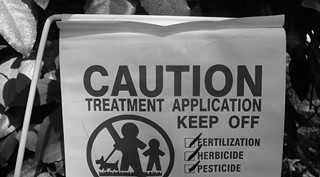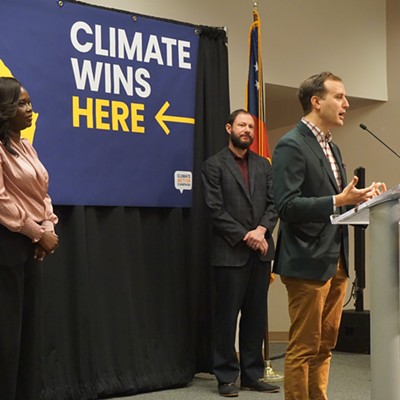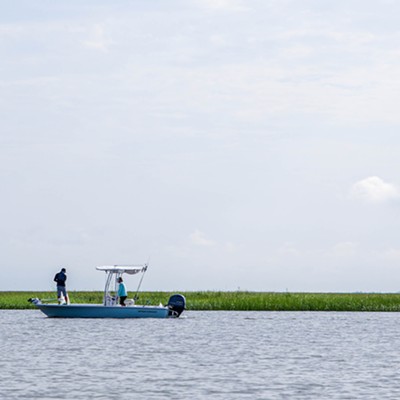Have you ever tried to persuade a vegan to eat a hamburger? Hold a juicy ground beef patty up to his mouth, say "It's good for you; your body needs the protein; it's so yummy."
No matter what argument you use he will not take a bite. It's a choice he's made and wherever vegans go they abide by that decision. If you've chosen to avoid pesticides it's not so simple.
You have the ability to keep your own house, yard and garden free of those chemicals but once you leave your property you are like a vegan being force fed a chili cheese dog.
In public parks, roadsides, medians and cemeteries the application of herbicides, fertilizers and pesticides is common practice. We seldom know what's been sprayed and what residue lingers.
One lovely afternoon last fall I noticed small white warning flags posted at Forsyth Park. On the southern lawn two young mothers with their babies were picnicking on a small blanket. When I asked them if they had seen the chemical application signs they grabbed their children and fled.
Children tumbling in the grass, Frisbee and soccer players falling onto the turf and kicking up dust that they and bystanders inhale, dogs rolling on the ground and going home to nap on the sofa - these are just a few of the ways toxic landscaping chemicals get personal with us.
In the following cautionary statement regarding the use of pesticides in schools and on playgrounds, the nonprofit Beyond Pesticides coalition sounds like it's in cahoots with Monty Python's Department of the Bleedin' Obvious:
"Pesticides should never be applied when students or employees are in the area or may be in the area within 24 hours of the application. In reality, certain types of pesticides, such as carcinogens, endocrine disrupters, reproductive toxins, developmental toxins, neurotoxins, persistent compounds and substances, bioaccumulative compounds and substances, toxicity category 1 acutely toxic pesticides and ground water contaminants should not be used around children."
I don't know about you, but I'm not keen about such chemicals being around me, my friends, my family, my pets, the birds, the butterflies, the bees, the waterways or children. But they are being used. Routinely. The quantity of synthetic pesticides, herbicides and fungicides applied in the urban landscape has increased and far exceeds the quantity of these chemicals used in agriculture.
For solace I turn to New Jersey.
Over 30 municipalities in that state have committed to pesticide-free public parks in response to the public's concern about the safety of children and the environment. New Jersey is in the process of passing the strictest anti-pesticide law in the nation. The Child Safe Playing Field act essentially bans all chemical applications on recreational fields, school playgrounds and at day care centers.
Environmentalists have been alarmed about toxic landscaping chemicals for years; they are now being joined by people concerned about another precious resource: our children. The Physicians for Social Responsibility organization agrees that one of the most overlooked pesticide contact pathways is the urban environment.
Children's small body mass and rapidly developing systems make them particularly vulnerable to toxins. The fact that kids explore the world in a more hand-on, uninhibited manner than adults increases their exposure to pesticide residues.
New Jersey is in the vanguard but a growing number of municipalities and states have integrated pest management systems (IPMs) mandating the reduction of pesticides on public lands. Unfortunately, these laws are not always understood or implemented.
Boulder, Colorado, however, has clearly paid attention. There the IPM is so successful that no herbicides have been used on Boulder's urban playing fields or park turf since 2003. Only after every attempt to utilize non-chemical methods has been exhausted is the decision made to use the least toxic product and to spot apply only.
The public's right to know is recognized and addressed rigorously through a website and phone message system that informs of any areas that will be treated a week or more in advance. In the advent that a chemical application is necessary, warning signs are posted a minimum of 24 hours prior to the treatment.
In Savannah the Parks and Trees Department, which maintains the northern section of Forsyth Park and the squares, takes a conservative approach regarding chemicals, applying them only on a per situation basis. Because of this policy you'll notice a few weeds in the grassy spaces indicating that the department is not heavy-handed with herbicides.
One of the best resources for information about pesticide issues, dangers, policies and alternatives is Beyond Pesticides, The National Coalition Against the Misuse of Pesticides (www.beyondpesticides.org).
In these times of expanding awareness it's wise for all to ponder their raison d'etre: Because Freedom from Pesticides is Everybody's Right.
























